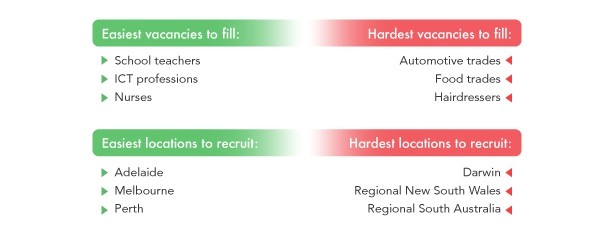Compare courses from top Australian unis, TAFEs and other training organisations.
Australia’s Skills Shortages Report Released: the Professions and Locations That Need You the Most
The 2013 Skills Shortages Australia report is out and it’s an invaluable road map for anyone wanting to see where the job opportunities lie before choosing a study path.
Julia Watters
Jun 16, 2025
Whether you’re planning a career change, entering the workforce, or deciding what to study, knowing which industries are crying out for skilled workers can give you a major advantage. The latest Skills Priority List released by Jobs and Skills Australia (JSA) provides a clear snapshot of occupations currently facing national shortages—and where demand is expected to grow.
In-Demand Skills in 2025
Many of the most sought-after roles are in technical, vocational, and health-related fields. If you’re training or upskilling, here are some of the areas with the most critical shortages in Australia:
- Health and Care: Registered nurses, aged and disability carers, physiotherapists, and mental health professionals remain in short supply across both metro and regional areas.
- Construction and Trades: Bricklayers, electricians, air conditioning mechanics, plumbers, and carpenters are consistently listed on the shortage index, with strong projected growth through 2026.
- Education: Early childhood, secondary and special education teachers are especially in demand, particularly in regional Australia.
- Engineering: Civil, structural and mining engineers continue to be in short supply, with demand being driven by infrastructure projects and net-zero transition plans.
- Tech and Digital: Cybersecurity analysts, software engineers, and ICT support roles are gaining prominence as digital transformation accelerates across all industries.
You can explore relevant training options via our range of online courses across these growing industries.
Where Are the Jobs?
Regional vs Metro Opportunities
According to the latest Labour Market Insights data, regional areas face greater skills shortages than their metro counterparts. For example, Northern Territory, regional Queensland, and parts of Western Australia continue to report shortages in key services, such as health, trades, and teaching. These areas often provide incentives, such as relocation grants and sign-on bonuses, to attract workers.
State-Based Insights
- New South Wales and Victoria: High demand in healthcare, IT, and education sectors, especially in growth corridors outside capital cities.
- Queensland: Strong demand in trades, health, and infrastructure-linked engineering roles, driven by population growth and the Brisbane 2032 Olympics pipeline.
- Western Australia: Consistently faces shortages in mining, construction, and allied health due to remote location challenges.
How Can You Position Yourself?
Upskilling into an industry experiencing a national shortage is one of the most reliable ways to boost employability, job security, and earning potential. Whether you’re interested in vocational training or a higher education pathway, Career FAQs can help you find a course that leads to opportunity.
- Browse Health Courses
- Explore Engineering Courses
- See IT & Cybersecurity Programs
- View Education & Teaching Options
Stay Future-Ready
Australia’s job market is evolving fast—and so are the skills employers need. By staying informed and strategically building your qualifications, you’ll be in the best possible position to land meaningful work in a field that needs you.
To stay ahead, sign up to our career newsletter and keep an eye on our news and views for regular updates.
About the author
Julia Watters covers topics in career development, educational guidance, and workplace success in her Career FAQs articles.
Categories

